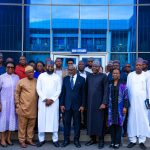The Standards Organisation of Nigeria (SON) is sounding the alarm on the need for stricter regulation and increased collaboration to address the recurring issue of building collapses in Nigeria.
Director General Dr. Ifeanyi Chukwunonso Okeke is leading the charge, emphasizing the imperative of a comprehensive approach to prevent future incidents and ensure the safety and integrity of structures nationwide.
The frequency of building collapses in Nigeria has become a source of concern, with devastating consequences for lives and properties.
In response, SON has conducted investigations to identify the root causes of these incidents. The findings are alarming, revealing a combination of factors contributing to the collapses. These include:
– Poor structural designs, which compromise the integrity of buildings
– Quackery and unprofessionalism, where unqualified individuals undertake construction projects
– Inadequate or lack of soil testing, leading to unstable foundations
– Poor construction practices and procedures, which neglect essential safety protocols
– Unapproved construction, where buildings are erected without regulatory approval
– Wrong demolition process, which can weaken adjacent structures
– Lack of maintenance, allowing minor issues to escalate into major problems
– Negligence, where responsible parties fail to address potential hazards
– Use of substandard materials, which can compromise the strength and durability of buildings
– Poor drainage, which can lead to water accumulation and structural damage
To address these issues, SON has taken proactive steps to develop and implement standards and codes of practice for the building and construction industry.
Since 2004, the organization has produced 168 standards and codes, including:
– Nigerian Industrial Standard (NIS) 117: 2004 Specification for Steel Bars for the Reinforcement of Concrete
– Nigerian Industrial Standard (NIS) 499: 2004 Standard for Iron and Steel
– Nigerian Industrial Standard (NIS) 588: 2007 Testing Hardened Concrete Part 1: Method for Determination of the Compressive Strength of Concrete Cores
– Nigerian Industrial Standard (NIS) 585: 2007 Standard for Concrete Admixtures – Part 1 – Specification for Accelerating Admixtures, Retarding Admixtures, and Water Reducing Admixtures
– Nigerian Industrial Standard (NIS) 156:1982 Standard Method for Testing Fresh Concrete
– Nigerian Industrial Standard (NIS) ISO 41001:2020 Facility Management System Standard
In addition to developing standards, SON has established regulatory powers through the SON Act to regulate locally manufactured products through its Mandatory Conformity Assessment Programme (MANCAP).
The organization also conducts pre-shipment verification of conformity to standards for imported goods through the Standards Organisation of Nigeria Conformity Assessment Programme (SONCAP). Furthermore, SON has introduced the Product Authentication Mark (PAM) to enable consumers to verify the authenticity of products before purchase.
To tackle the issue of substandard steel reinforcement bars, SON has set up a task force to standardize these products.
The task force engages stakeholders in the sector and conducts nationwide enforcement in factories and marketplaces, sanctioning culpable dealers in line with the provisions of the SON Act No.14 2015.
SON recognizes that achieving a safe environment through standardization and quality assurance is an ongoing responsibility.
The organization reiterated it’s commitment to collaborating with other sector regulators and agencies, including the Council for the Regulation of Engineering in Nigeria (COREN), Nigeria Building and Road Research Institute (NBRRI), Nigerian Institute of Quantity Surveyors (NIQS), Raw Materials, Research and Development Council (RMRDC), and the Ministry of Works, among others.
By working together, these stakeholders can ensure that Nigeria’s building and construction industry adheres to global best practices, prioritizing safety and quality above all else.









Comment here